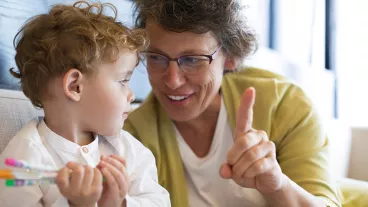Working Together to Care for Kids: Carers' views - Rewards and challenges
4 of 5
May 2018
Download Research snapshot
Overview
This Research Snapshot explores the thoughts and feelings of carers of out-of-home-care children about their care experience (i.e., the extent to which they felt that they made a positive difference to the lives of these vulnerable children, and what challenges they had faced as a carer), as well as carers' reports on whether they would be a carer of out-of-home-care children again in the future.1
1 The information in this Research Snapshot is based on Working Together to Care for Kids: A Survey of Foster and Relative/Kinship Carers, which collected data from 2,203 foster and relative/kinship carers in 2016 via telephone interview. The survey was conducted by the Australian Institute of Family Studies (AIFS) in 2016, in collaboration with the Australian Government Department of Social Services (DSS), and funded by DSS. The sample was drawn from foster and relative/kinship carers who registered in the states/territories (except Northern Territory) as formal carers of out-of-home-care children aged 0-17 years old at 31 December 2015.
Key messages
-
Carers, in general, felt a strong sense of reward in looking after children in out-of-home care, feeling that they made positive contributions to the lives of these vulnerable children.
-
Carers faced various challenges in looking after children in out-of-home care, with the majority finding it stressful to manage the children's behaviours.
-
A minority of carers found that looking after children in out-of-home care had a negative impact on their family relationships and meeting family/work responsibilities.
-
Carers' views were mixed regarding whether they would be a carer again in the future, with four in ten carers indicating that they would likely be a carer again. Care experiences such as high levels of care challenges and receiving inadequate support were associated with the reluctance to be a carer again in the future.
Overall views
Carers were asked of their agreement or disagreement with a series of statements that considered both the rewards and the challenges they experienced in caring for a child/children in out-of-home care. The extent of agreement with each statement is shown in Table 1.
- Carers in general considered their care experience to be very rewarding.
- Almost all carers strongly agreed/agreed that they could make a positive difference in the life of a child, provide the child with a positive family experience, and that looking after a child was a rewarding experience.
- The majority of carers also indicated that their family was happy for the child to be living with them.
- Carers also faced various challenges in looking after the vulnerable children.
- The majority of carers agreed that managing the children's behaviours was difficult, and that looking after these children required more time/effort than other children of the same age and gender.
- Nearly half of carers strongly agreed/agreed that looking after these children was very stressful.
- Some carers indicated that there were impacts on their families and themselves of looking after these vulnerable children.
- One-third of carers agreed that caring for these children made it difficult for them to meet other family/work responsibilities.
- One in six agreed that caring responsibilities had a negative effect on their relationship with other family members.
- Overall, foster and relative/kinship carers provided similar views on their experiences.
Carers' views were also sought about the level of support they received with looking after the study child (see Table 2).2
- One-half of carers felt that they received an adequate level of allowances to care for their study child.
- More than one-half of carers felt supported by agencies/services in meeting the study child's needs, though a lower proportion of relative/kinship carers than foster carers felt this way.
- The majority of carers indicated that contact arrangements with the study child's biological parent(s) were manageable. Nevertheless, relative/kinship carers were less positive about this than foster carers.
- Relative/kinship carers reported higher levels of contact (face-to-face and other forms) between their study child and the child's parents than foster carers (see the research report, section 4.6), which may explain the less positive views of relative/kinship carers on this aspect.
- It is also worth noting that most relative/kinship carers agreed that there was no other relative who was able to look after the study child. In other words, they had no choice but to take on the caring role.
| Statementa | Foster (%) | Relative/kinship carers (%) | All (%) |
|---|---|---|---|
| I can make a positive difference in the life of a child. | 97.6 | 96.0 | 96.8 |
| I can provide a child with a positive family experience. | 97.8 | 95.3 | 96.4 |
| Looking after a child is a rewarding experience. | 92.5 | 90.1 | 91.2 |
| My family is happy for a child to live with us in out-of-home care. | 91.7 | 85.2 | 88.3 |
| Carers should be provided with legal assistance to sort out care arrangements if required. | 81.1 | 90.8 | 86.1 |
| I have the financial resources to adequately care for a child in out-of-home care. | 69.0 | 65.0 | 66.9 |
| Managing a child's behaviour is difficult. | 68.7 | 57.3 | 62.7 |
| Looking after a child in out-of-home care requires more time/effort than another child of the same age and gender. | 72.2 | 53.7 | 62.5 |
| It is important for a child in out-of-home care to keep in contact with their parents. | 57.3 | 56.6 | 56.9 |
| Looking after a child in out-of-home care is very stressful. | 50.8 | 45.1 | 47.8 |
| Caring for a child makes it difficult for me to meet other family/work responsibilities. | 28.6 | 33.9 | 31.4 |
| I'm monitored too closely in looking after a child in out-of-home care. | 25.3 | 25.7 | 25.5 |
| Caring for a child in out-of-home care has a negative effect on my relationship with other family members. | 12.6 | 18.3 | 15.6 |
Notes: Percentages are based on weighted data and small numbers of respondents' "Don't know" were excluded from the analysis for each item. a The statements are arranged based on the proportion of carers who were agreed, from highest to lowest.
| Statement | Foster (%) | Relative/kinship carers (%) | All (%) |
|---|---|---|---|
| No other relative to look after study child (relative/kinship care only) | - | 71.5 | - |
| Allowances received were adequate to care for study child | 48.5 | 53.4 | 51.0 |
| Contact arrangements with study child's biological parent(s) were manageable | 70.5 | 62.8 | 66.1 |
| Felt supported by agencies/services in meeting study child's needs | 59.2 | 53.6 | 56.3 |
2 Many questions in the study relating to children focused on one child (hence called "study child"). If a carer looked after more than one out-of-home-care child, the study child was randomly selected.
Rewards and challenges by care experiences
- Although carers felt a sense of reward from their care experiences regardless of study children's prior history of abuse or developmental conditions, carers whose study child had a developmental condition appeared to express a lower sense of reward.
- It is not surprising that carers reported more challenges if children had previously experienced or been exposed to multiple types of abuse/violence/neglect or had developmental conditions.
Views on looking after other children in out-of-home care in the future
Carers were asked about the likelihood to look after another child in out-of-home care in the future and their responses on this were split.
- Overall, four in ten carers indicated that they were either likely or very likely to look after another child in the future.
- However, nearly one-half of carers held the opposite view, that they were unlikely or very unlikely to do so in the future.
Carers' views on caring for other children in out-of-home care in the future also differed according to care type, carers' age and other characteristics as well as their care experience.
- Foster carers were much more likely than relative/kinship carers to express that they would be carers again.
- The following factors were associated with a lower likelihood of looking after other children in out-of-home care in the future:
- older carers (aged 40 years or older), relative to younger carers;
- living with a partner, relative to being single;
- looking after study children aged 5 years and younger, relative to caring for older children; and
- looking after study children who experienced (and/or were exposed to) multiple forms of violence/abuse/neglect.
- Carers' views on their care experience were also linked to their intention of being a carer again in the future. A lower likelihood of looking after other children in out-of-home care in the future was linked to:
- a lower sense of reward;
- higher levels of challenges;
- lower levels of agreement with the statements on receiving adequate allowances for caring for study children; and
- feeling a lack of support from government and agencies.
Featured image: istockphoto/Ridofranz
Qu, L., Lahausse, J., & Carson, R. (2018). Working Together to Care for Kids: A survey of foster and relative/kinship carers. (Research Report). Melbourne: Australian Institute of Family Studies.
Download Research snapshot
Related publications

Working Together to Care for Kids: Carer service use and…
This Research Snapshot focuses on carers' reports on their access to and views on service support.
Read more
Working Together to Care for Kids: Carer support and…
This Research Snapshot focuses on carers' reports on training they had received and the degree of contact with their…
Read more
Working Together to Care for Kids: Carers' wellbeing and…
This Research Snapshot directs attention to carers' wellbeing and their family relationships.
Read more